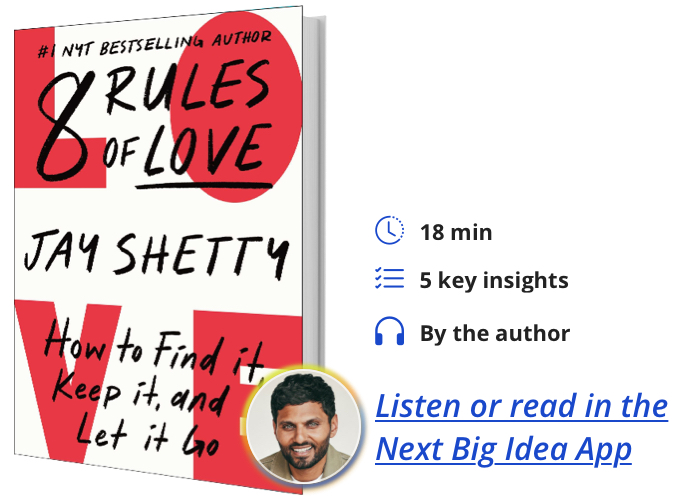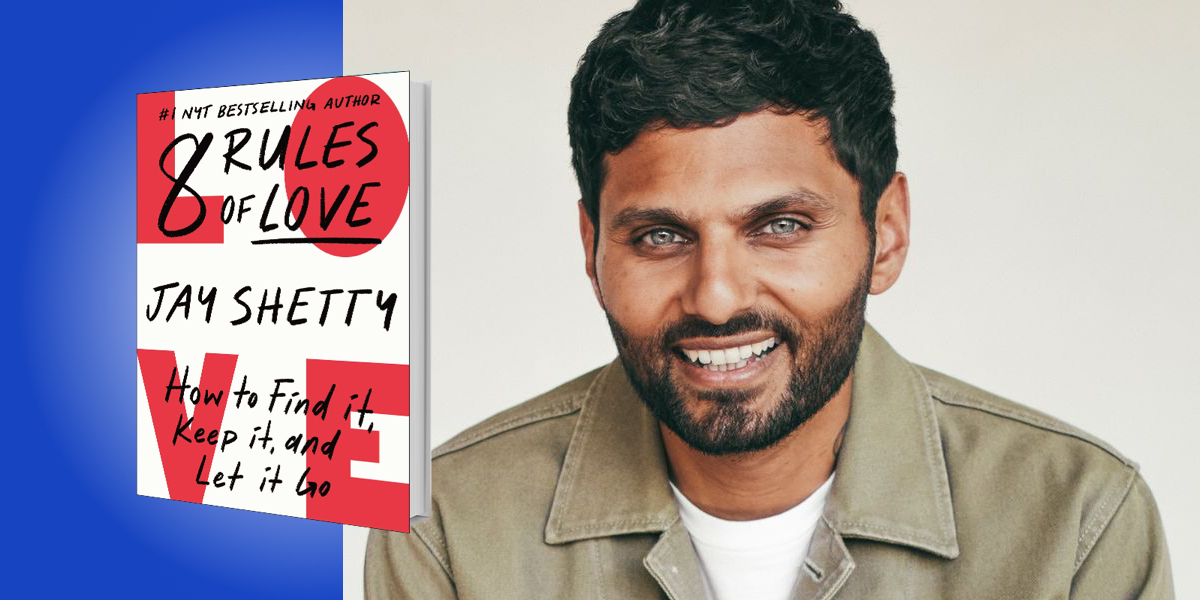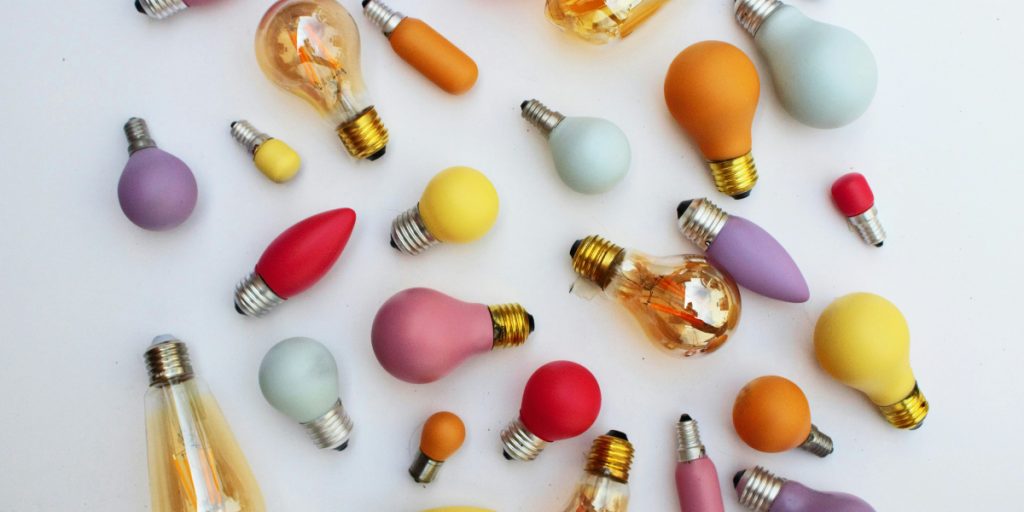Jay Shetty is a behavioral science graduate from Cass Business School, an author, life coach, and host of the On Purpose podcast. He is also chief purpose officer at Calm.
Below, Jay shares 5 key insights from his new book, 8 Rules of Love: How to Find It, Keep It, and Let It Go. Listen to the audio version—read by Jay himself—in the Next Big Idea App.

1. Let yourself be alone.
A lot of studies and research have gone into why being alone, being confident, and being single is not only better for you, but also better for your future partner. Professor and clinical psychologist Bella DePaulo says, “It’s a broad misconception that single people are to blame for the high levels of loneliness reported internationally.” In fact, studies show that overall, the longer people are single in life, the happier they become.
Researchers from the German Center of Gerontology analyzed data from more than 2,500 participants in a German aging survey. They found that as time went on, people became happier with their single status, and their relationship status became less relevant to them. DePaulo writes that over time, single life gets better and better, and for individuals as they age, satisfaction with their single lives continues to rise.
DePaulo points to research that when asked to predict their levels of happiness should they stay single, college students thought that over the next five years they’d experience roughly three out of 10 on the happiness scale. Conversely, if they got married, they imagined they’d be just above an eight. In reality the average happiness rating of a single person was just above a seven, and continued climbing as the years went on.
As DePaulo says, “One of our challenges culturally is that we don’t tell positive affirming stories about people who are single.” Whether you look at movies, music, or TV shows, usually, even though people in relationships are struggling, it’s highlighted when someone’s alone.
2. Chemistry starts a relationship, but character makes it last.
If you ask a friend or family member who’s dating right now, they’ll tell you they’ve been going on a lot of dates recently, but they haven’t felt any spark or chemistry. We are addicted to this idea of feeling a spark or chemistry. It’s healthy to be attracted to the person that we want to spend our lives with, or at least some of our life with, but we’re all chasing this intangible ethereal feeling. Studies show that when young, our prefrontal cortex is not fully developed so we think with our feelings, instead of reason and self-control. It’s natural when we’re young to feel more spark or chemistry.
Do you remember when you were 16? Do you remember having your first crush? At 16, it’s so much easier to feel the spark and chemistry than when you’re older because our prefrontal cortex is not yet fully developed. As we get older, our reasoning power, self-control, discipline, and ability to be more discerning are all strengthened.
Another problem with over-emphasizing chemistry is that it doesn’t take character into account. Character traits such as our interests and values are far important for a successful long-term relationship. Chemistry starts a relationship, compatibility keeps it going, and character protects the relationship when things are falling apart.
“When you see someone’s personality, you see what you like, but when you see someone’s character, you see the more difficult, challenging parts of them.”
When you are dating, when you are first getting to know someone, you’re looking for that inner spark. But in the end, it’s their character that will keep that relationship intact. We often don’t really know the character of our partner, we only know their personality. Character is different—it’s how they behave when they’re stressed, when they’re fatigued, and when they’re in a bad mood. When you see someone’s personality, you see what you like, but when you see someone’s character, you see the more difficult, challenging parts of them.
It’s much healthier and more important to see your partner in multiple interactions over time before you’ve gone too far in. Studies show that you need around 40 hours to consider someone a casual friend, a hundred hours to consider someone a good friend, and 200 hours to consider someone a great friend.
If you’ve not spent 200 quality hours with someone, don’t say I love you, don’t expect to hear I love you back. If you hear it, think about it, reflect on it, and slow it down. Wait for two hundred quality hours—not in a cinema, not on your phone—200 hours of quality time being present with each other.
3. Relationships end because patience, kindness, and understanding end.
A lot of people say, “We just don’t love each other anymore, we’ve fallen out of love.” What that means is that love wasn’t enough. There were character traits that we needed that we didn’t find in that partner, that we didn’t recognize we needed to grow the relationship. The Gottman Institute, which publishes studies on relationships, talked about how the number one thing that keeps couples together is not date nights, holiday cruises, or walks on the beach, it’s their ability to learn how to argue, the ability to turn an argument into a discussion. Fighting and arguing push you apart, but discussion and debate bring you closer.
The opposite of fighting and arguing isn’t avoiding and pivoting around problems, leaving them until they erupt or explode—it’s understanding your fight style: venting, hiding, or exploding. Venting is when you say, “I want to talk about it, I want to talk about it right now.” Hiding is when you say, “I don’t want to talk about it, give me some space.” And exploding is, “I want to talk about how I feel!” None of these are better or worse than the other. When you understand your partner’s fight style, you learn how to respond. Normally, during a fight, we have a fight style and we don’t like our partner’s fight style. However, it’s better to know their fight style so you can understand them. This can develop a way to healthier conversations, debates, discussions and disagreements, rather than arguments and fights.
4. Intimacy is more than sex.
Oxytocin is related to the feeling of being in love. When we have sex, men’s oxytocin levels spike about 500 percent. Men and women feel closer chemically during and after sex, but we are not actually closer emotionally. Most people have had some experience of being in an unhealthy relationship: lots of arguing, a bit toxic, not transparent, but the sex and the physical connection was incredible. Emotionally you feel distant, but physically you feel close.
“Men and women feel closer chemically during and after sex, but we are not actually closer emotionally.”
The hormone oxytocin has a temporary blocking effect on negative memories, those moments that were warning sign. The hormone makes you feel safe and secure even though you’re not. This is why people have makeup sex, breakup sex, and get back together; it’s used as a crutch in a relationship because it makes us feel good. It’s the only time you may feel safe and connected to someone.
However, you need to make sure you feel safe and connected when you’re not having sex. If you’re only feeling safe when you’re having sex, chances are you’re missing out on much more intimacy.
5. There are more types of love than romantic love.
The ancient Greeks believed that there were seven basic types of love: Eros (sexual or passionate love), Philia (friendship), Storge (familial), Agápe (universal), Ludus (casual or non-committal), Pragma (based on duty), and Philautia (self-love). More recently, psychologist Tim Lomas, a lecturer in the Human Flourishing Program at Harvard University, analyzed 50 languages and identified 14 unique kinds of love.
We’ve put romantic love on such a pedestal in society that we believe that even if you have an amazing relationship with your dad, mom, kids, siblings, and friends, but don’t also have romantic love, then you are incomplete. Don’t compare all these beautiful bonds that we have. Is the love you have for your children less important or more important than the love you have for your partner or your own parents?
Many people have lost someone naturally or after a long relationship has broken down—does that mean that all the other love in their life is disqualified? Some of the most incredible things in the world, some of the most amazing sacrifices and the greatest acts of love were not because of romantic love, but because of a person’s love for their people, for society, for humanity.
The greatest acts of love are rarely romantic. Remember that you can experience love whenever you choose to express it. In order to truly feel love, you must give love. Stop obsessing over just wanting it, wishing for it, waiting for it, and actually start giving it. If you express love every day, you’ll experience love every day.
To listen to the audio version read by author Jay Shetty, download the Next Big Idea App today:
































